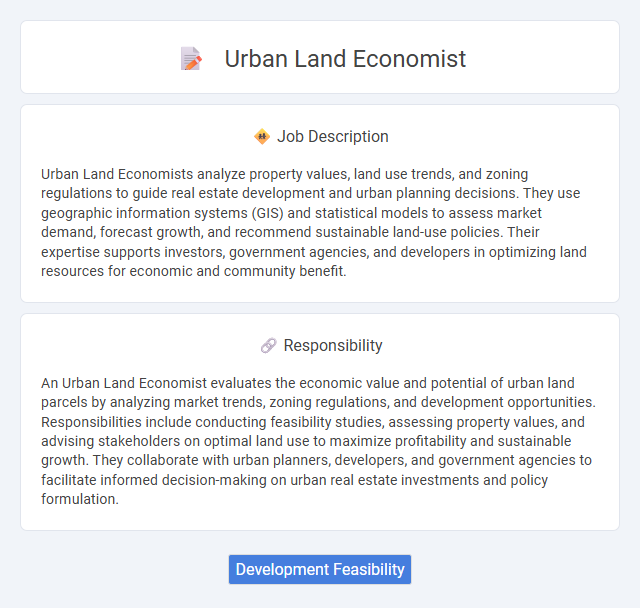
Urban Land Economists analyze property values, land use trends, and zoning regulations to guide real estate development and urban planning decisions. They use geographic information systems (GIS) and statistical models to assess market demand, forecast growth, and recommend sustainable land-use policies. Their expertise supports investors, government agencies, and developers in optimizing land resources for economic and community benefit.
Individuals with strong analytical skills and a keen interest in real estate markets are likely to excel as Urban Land Economists. Those comfortable working with data, economic trends, and urban development policies may find this role particularly suitable. People who prefer dynamic environments involving research, forecasting, and advising on property land use might have a higher probability of success in this career.
Qualification
A successful Urban Land Economist typically holds a degree in economics, urban planning, real estate, or a related field, complemented by strong analytical skills and proficiency in geographic information systems (GIS). Professional certifications such as MAI (Member of the Appraisal Institute) or credentials in urban economics enhance job qualifications. Experience in market analysis, land valuation, and policy evaluation is essential for accurate forecasting and informed decision-making in urban development projects.
Responsibility
An Urban Land Economist evaluates the economic value and potential of urban land parcels by analyzing market trends, zoning regulations, and development opportunities. Responsibilities include conducting feasibility studies, assessing property values, and advising stakeholders on optimal land use to maximize profitability and sustainable growth. They collaborate with urban planners, developers, and government agencies to facilitate informed decision-making on urban real estate investments and policy formulation.
Benefit
Urban Land Economist roles likely offer significant benefits, including the potential for high earning power due to the specialized expertise in property valuation and market analysis. Professionals in this field may enjoy strong job stability and opportunities for career growth as urban development continues to expand globally. Access to diverse projects involving real estate investment, urban planning, and policy advising could enhance professional skills and marketability over time.
Challenge
The Urban Land Economist job likely involves complex challenges related to predicting market trends and valuing properties amid fluctuating urban development patterns. Navigating regulatory frameworks and environmental concerns could present significant hurdles that require detailed analysis and strategic planning. Balancing economic feasibility with sustainable growth may prove to be a continuous obstacle in this dynamic field.
Career Advancement
Urban Land Economists analyze land use patterns and real estate markets to advise on sustainable urban development, leveraging expertise in economic trends and spatial data analysis. Career advancement often involves progressing to senior consulting roles, policy advisory positions within government agencies, or leadership roles in urban planning and development firms. Mastery of GIS technologies, econometric modeling, and strong stakeholder engagement skills significantly enhance promotion prospects in this sector.
Key Terms
Development Feasibility
Urban Land Economists specializing in Development Feasibility analyze land use, market trends, and economic factors to assess the viability of real estate projects. They conduct detailed cost-benefit analyses, zoning impact studies, and financial modeling to guide investment decisions and urban planning. Their expertise ensures sustainable growth by balancing economic potential with regulatory and environmental constraints.
 kuljobs.com
kuljobs.com